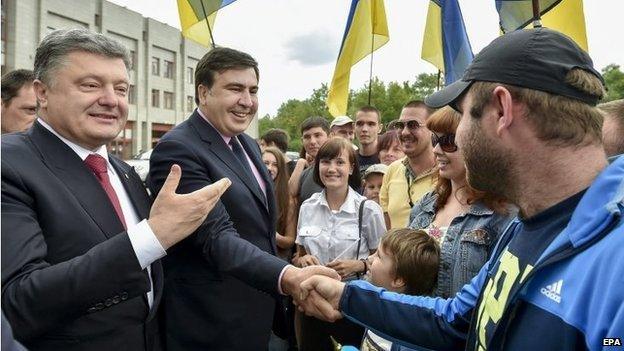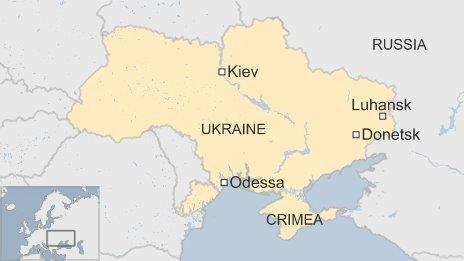Georgia ex-leader Saakashvili gives up citizenship for Ukraine
- Published
When he became governor of Odessa in 2015, Mikheil Saakashvili told the BBC he would fight corruption and criminality
Georgian ex-President Mikheil Saakashvili says he is giving up Georgian citizenship as he becomes governor of Ukraine's Odessa region.
Mr Saakashvili told the BBC a Georgian passport meant "guaranteed imprisonment" there as the authorities pursued criminal charges against him.
The ex-leader was appointed unexpectedly by Ukrainian President Petro Poroshenko on Saturday.
He is credited with radical reforms in Georgia but accused of abuse of power.
Mr Saakashvili left Georgia after his term as president ended in 2013. He denies the charges against him, which he says are politically motivated.
The former president, who has been granted Ukrainian citizenship, speaks basic Ukrainian and was recently said to have sung the national anthem with a group of Odessa schoolchildren.
'Frontline' region
In a BBC interview, Mr Saakashvili said he could not currently go back home.
"The reality is for me today that the Georgian passport means guaranteed imprisonment for me in Georgia," he said.
He added that the governorship was important because Odessa was a "frontline" both against local corruption and against perceived Russian aggression in the region.
"If Odessa ever falls, God forbid, then Georgia might be wiped out from the map," he said.
Mr Poroshenko chose him because he understood the need for radical reform and knew he would take a hard line on corruption and organised crime, Mr Saakashvili added.

President Poroshenko (left) presented Mikheil Saakashvili (centre) to Odessa residents on Saturday
The BBC's David Stern in Kiev says the former Georgian leader is a political outsider in Odessa and has a reputation for divisiveness, but is pro-Western and loyal to Mr Poroshenko.
His appointment has caused controversy and could be either a stroke of genius or a huge blunder, our correspondent adds.
President Poroshenko made the announcement at a televised event in Odessa on Saturday, with Mr Saakashvili standing beside him.
Russian Prime Minister Dmitry Medvedev made sarcastic comments on the appointment, describing it as a "Chapiteau-show" - in a reference to a popular Russian farcical comedy. Mr Saakashvili described his reaction as "hysterical".
Moscow has been highly critical of Mr Saakashvili since Georgia and Russia fought a brief war in 2008.

Unlike Ukraine's eastern Donetsk and Luhansk regions, Odessa has not been hit by the fighting between government forces and pro-Russian rebels.
However, tensions in the strategic port remain high after clashes between pro- and anti-government protesters on 2 May 2014 left more than 40 people dead.
The majority of those who died were pro-Russian activists who perished in a fire in a trade union building. Investigations into what caused the blaze are continuing.
The Ukrainian government, Western leaders and Nato all say there is clear evidence that Russia is helping the rebels in the east with heavy weapons and soldiers. Independent experts echo that accusation.
Moscow denies it, insisting that any Russians serving with the rebels are volunteers.
More than 6,000 people have been killed in fighting in eastern Ukraine that began in April 2014 when rebels seized large parts of the Donetsk and Luhansk regions. This followed Russia's annexation of the Crimea peninsula.